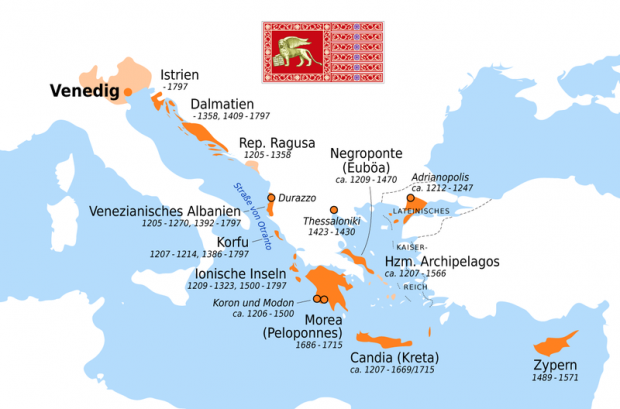With an 89 percent majority, the voters of Venice have elected to leave Italy. In practice, what this really means is that the Venetians plan to no longer send tax revenues to Rome. Apparently, the Venetians, who inhabit the historical capital of one of humanity’s richest and most successful republics, wish to no longer subsidize the famously-corrupt bureaucrats in Rome. Southern Italy has long been regarded by the richer, cleaner, and more efficient North as a drain on their resources. According to the Daily Mail, at least, there is talk of extending the secession movement to other areas of the North as well.
[amazon asin=0765808684&template=*lrc ad (left)]One pro-secessionist sounds like a Hoppean:
Campaigner Paolo Bernardini, professor of European history at the University of Insubria in Como, northern Italy, said it was ‘high time’ for Venice to become an autonomous state once again.
‘Although history never repeats itself, we are now experiencing a strong return of little nations, small and prosperous countries, able to interact among each other in the global world.’
‘The Venetian people realized that we are a nation (worthy of) self-rule and openly oppressed, and the entire world is moving towards fragmentation – a positive fragmentation – where local traditions mingle with global exchanges.’
Naturally, the large nation-states of Europe hate and fear developments like this. But for anyone who can remember history, there’s little “tradition” here that the nation-states can lay claim to. Italy is a made-up country, much like Germany, hammered together in the 19th century by powerful authoritarian politicians like Otto von Bismarck who of course hated classical liberalism and capitalism with every fiber of his being.[amazon asin=0945466404&template=*lrc ad (right)]
It will be interesting to see what Rome does. Will they send an army to take their tax money? Perhaps they’ll just wage some sort of campaign of hate against the Venetians, appealing to Italian patriotism. Given that Obama recently declared all secession movements illegitimate (except those supported by the US Government, of course) it’s unknown how much support Venice can expect from the international community.
In a 2004 interview, Hans-Hermann Hoppe spoke on the advantages of small independent (and wealthier) countries:
To the contrary, the greatest hope for liberty comes from the small countries: from Monaco, Andorra, Liechtenstein, even Switzerland, Hong Kong, Singapore, Bermuda, etc.; and as a liberal one should hope for a [amazon asin=094546620X&template=*lrc ad (left)]world of tens of thousands of such small independent entities. Why not a free independent city of Istanbul and Izmir, which maintain friendly relations with the central Turkish government, but which no longer make tax payments to the latter nor receive any payments from it, and which no longer recognize central government law but have their own Istanbul law or Izmir law.
The apologists of the central state (and of superstates such as the EU) claim that such a proliferation of independent political units would lead to economic disintegration and impoverishment. However, not only does empirical evidence speak sharply against this claim: the above-mentioned small countries are all wealthier than their surroundings. Moreover, theoretical reflection also shows that this claim is just another statist myth.
Small governments have many close competitors. If they tax and regulate their own subjects visibly more than their competitors, they are bound to suffer from the emigration of labor and capital. Moreover, the [amazon asin=B00DVUBO2E&template=*lrc ad (right)]smaller the country, the greater will be the pressure to opt for free trade rather than protectionism. Every government interference with foreign trade leads to relative impoverishment, at home as well as abroad. But the smaller a territory and its internal markets, the more dramatic this effect will be. If the U.S. engaged in protectionism, U.S. average living standards would fall, but no one would starve. If a single city, say Monaco, did the same, there would be almost immediate starvation. Consider a single household as the conceivably smallest secessionist unit. By engaging in unrestricted free trade, even the smallest territory can be fully integrated in the world market and partake of every advantage of the division of labor. Indeed, its owners may become the wealthiest people on earth. On the other hand, if the same household owners decided to forego all inter-territorial trade, abject poverty or death would result. Accordingly, the smaller the territory and its internal market, the more likely it is that it will opt for free trade.
Moreover, as I can only indicate but not explain here, secession also promotes monetary integration and would lead to the replacement of the present monetary system of fluctuating national paper currencies with a commodity money standard entirely outside of government control. In sum, the world would be one of small liberal governments economically integrated through free trade and an international commodity money such as gold. It would be a world of unheard of prosperity, economic growth, and cultural advancement.




